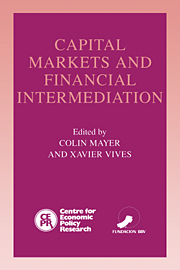40 results
50 - Naming and Shaming: Evidence from Event Studies
- from Part VIII - Measuring and Evaluating Compliance
-
-
- Book:
- The Cambridge Handbook of Compliance
- Published online:
- 07 May 2021
- Print publication:
- 20 May 2021, pp 748-760
-
- Chapter
- Export citation
Regulatory Sanctions and Reputational Damage in Financial Markets
-
- Journal:
- Journal of Financial and Quantitative Analysis / Volume 52 / Issue 4 / August 2017
- Published online by Cambridge University Press:
- 03 July 2017, pp. 1429-1448
- Print publication:
- August 2017
-
- Article
-
- You have access
- Export citation
11 - Common Knowledge: The Missing Link in Hybrid Value Chains?
- from Part Two - Working Relationally in Networks
-
-
- Book:
- Working Relationally in and across Practices
- Published online:
- 28 March 2017
- Print publication:
- 26 January 2017, pp 191-208
-
- Chapter
- Export citation
Contributors
-
-
- Book:
- Socioeconomic and Environmental Impacts of Biofuels
- Published online:
- 05 September 2012
- Print publication:
- 06 August 2012, pp vii-x
-
- Chapter
- Export citation
Contributors
-
-
- Book:
- The Cambridge Handbook of Intelligence
- Published online:
- 05 June 2012
- Print publication:
- 30 May 2011, pp xi-xiv
-
- Chapter
- Export citation
4 - How Do Financial Systems Affect Economic Performance?
-
-
- Book:
- Corporate Governance
- Published online:
- 05 June 2012
- Print publication:
- 02 October 2000, pp 137-168
-
- Chapter
- Export citation
Editorial
-
- Journal:
- European Business Organization Law Review (EBOR) / Volume 1 / Issue 1 / March 2000
- Published online by Cambridge University Press:
- 17 February 2009, pp. 1-2
- Print publication:
- March 2000
-
- Article
-
- You have access
- Export citation
1 - Introduction
-
-
- Book:
- Capital Markets and Financial Intermediation
- Published online:
- 04 August 2010
- Print publication:
- 20 May 1993, pp 1-11
-
- Chapter
- Export citation

Capital Markets and Financial Intermediation
-
- Published online:
- 04 August 2010
- Print publication:
- 20 May 1993
List of conference participants
-
- Book:
- Capital Markets and Financial Intermediation
- Published online:
- 04 August 2010
- Print publication:
- 20 May 1993, pp xviii-xx
-
- Chapter
- Export citation
Index
-
- Book:
- Capital Markets and Financial Intermediation
- Published online:
- 04 August 2010
- Print publication:
- 20 May 1993, pp 349-357
-
- Chapter
- Export citation
List of figures
-
- Book:
- Capital Markets and Financial Intermediation
- Published online:
- 04 August 2010
- Print publication:
- 20 May 1993, pp xiii-xiv
-
- Chapter
- Export citation
Contents
-
- Book:
- Capital Markets and Financial Intermediation
- Published online:
- 04 August 2010
- Print publication:
- 20 May 1993, pp ix-xii
-
- Chapter
- Export citation
List of tables
-
- Book:
- Capital Markets and Financial Intermediation
- Published online:
- 04 August 2010
- Print publication:
- 20 May 1993, pp xv-xvi
-
- Chapter
- Export citation
Preface
-
-
- Book:
- Capital Markets and Financial Intermediation
- Published online:
- 04 August 2010
- Print publication:
- 20 May 1993, pp xvii-xvii
-
- Chapter
- Export citation
Frontmatter
-
- Book:
- Capital Markets and Financial Intermediation
- Published online:
- 04 August 2010
- Print publication:
- 20 May 1993, pp i-viii
-
- Chapter
- Export citation
10 - Financing and development in Eastern Europe and the former Soviet Union: issues and institutional support
-
-
- Book:
- Finance and Development
- Published online:
- 05 November 2011
- Print publication:
- 25 March 1993, pp 303-342
-
- Chapter
- Export citation
List of conference participants
-
- Book:
- European Financial Integration
- Published online:
- 04 August 2010
- Print publication:
- 04 April 1991, pp xvii-xviii
-
- Chapter
- Export citation
List of tables
-
- Book:
- European Financial Integration
- Published online:
- 04 August 2010
- Print publication:
- 04 April 1991, pp xiv-xv
-
- Chapter
- Export citation
List of figures
-
- Book:
- European Financial Integration
- Published online:
- 04 August 2010
- Print publication:
- 04 April 1991, pp xiii-xiii
-
- Chapter
- Export citation



